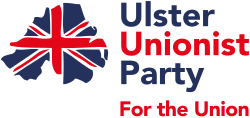
Back حزب ألستر الوحدوي Arabic Ольстэрская юніянісцкая партыя Byelorussian Ольстэрская юніянісцкая партыя BE-X-OLD আলস্টার ইউনিয়নিস্ট পার্টি Bengali/Bangla Partit Unionista de l'Ulster Catalan Plaid Unoliaethol Ulster Welsh Ulster Unionist Party Danish Ulster Unionist Party German Ενωτικό Κόμμα του Όλστερ Greek Partido Unionista del Úlster Spanish
Ulster Unionist Party | |
|---|---|
 | |
| Abbreviation | UUP |
| Leader | Mike Nesbitt |
| Chairman | Jill Macauley |
| Deputy leader | Robbie Butler |
| Founded | 3 March 1905 |
| Preceded by | Irish Unionist Alliance |
| Headquarters | Strandtown Hall 2–4 Belmont Road Belfast BT4 2AN |
| Youth wing | Young Unionists |
| Women's wing | Ulster Women's Unionist Council |
| Ideology | |
| Political position | Centre-right[3] |
| European affiliation | European Conservatives and Reformists Party (Global partner) |
| National affiliation | Conservative Party (1922–1972; 2009–2012) |
| Colours | Blue |
| Slogan | For the Union |
| House of Commons (NI seats) | 1 / 18 |
| House of Lords | 3 / 799 |
| NI Assembly | 9 / 90 |
| Councillors in Northern Ireland[4] | 52 / 462 |
| Councils led | 1 / 11 |
| Website | |
| www | |
The Ulster Unionist Party (UUP) is a unionist political party in Northern Ireland.[5] The party was founded as the Ulster Unionist Council in 1905, emerging from the Irish Unionist Alliance in Ulster. Under Edward Carson, it led unionist opposition to the Irish Home Rule movement. Following the partition of Ireland, it was the governing party of Northern Ireland between 1921 and 1972. It was supported by most unionist voters throughout the conflict known as the Troubles, during which time it was often referred to as the Official Unionist Party (OUP).[6][7]
Under David Trimble, the party helped negotiate the Good Friday Agreement of 1998, which ended the conflict. Trimble served as the first First Minister of Northern Ireland from 1998 to 2002. However, it was overtaken as the largest unionist party in 2003 by the Democratic Unionist Party (DUP). As of 2022 it is the fourth-largest party in the Northern Ireland Assembly, after Sinn Féin, the DUP, and the Alliance Party. Since August 2024 the party has been led by Mike Nesbitt.
Between 1905 and 1972, its peers and MPs took the Conservative Party whip at Westminster, in effect functioning as the Northern Irish branch of the party. This arrangement came to an end in 1972 over disagreements over the Sunningdale Agreement. The two parties have remained institutionally separate ever since, with the exception of the 2009 to 2012 Ulster Conservatives and Unionists electoral alliance. The first-ever membership survey of the UUP, published in January 2019, suggested that 67% of its members were supportive of the Conservative Party.[8]
- ^ a b Nordsieck, Wolfram (2017). "Northern Ireland/UK". Parties and Elections in Europe. Archived from the original on 7 November 2016. Retrieved 28 September 2018.
- ^ "Nesbitt says NI needs liberal progressive politicians". Belfast Newsletter. Archived from the original on 26 April 2016. Retrieved 14 April 2016.
- ^ Ari-Veikko Anttiroiko; Matti Mälkiä (2007). Encyclopedia of Digital Government. Idea Group Inc (IGI). pp. 394–. ISBN 978-1-59140-790-4. Archived from the original on 25 December 2018. Retrieved 17 October 2015.
- ^ "Local council political compositions". Open Council Data UK. Archived from the original on 3 June 2021. Retrieved 8 January 2021.
- ^ "NI parties step on election trail". BBC News. 5 April 2005. Archived from the original on 9 May 2007. Retrieved 9 April 2010.
- ^ "Abstracts of Organisations – 'U'". Conflict Archive on the Internet. University of Ulster. 23 September 2015. Ulster Unionist Party (UUP). Archived from the original on 22 February 2011. Retrieved 17 June 2016.
- ^ "Ulster Unionist Party". Politics 97. BBC. 1997. Archived from the original on 6 May 2017. Retrieved 17 June 2016.
- ^ "Who are the UUP Members—and What do they Believe?". January 2019. Retrieved 18 August 2023.